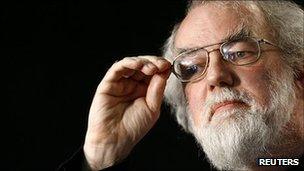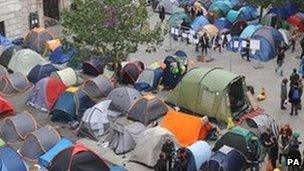Archbishop of Canterbury offers St Paul's leadership
- Published

Dr Williams has attempted to show leadership by speaking out on the protest at St Paul's
As St Paul's - and the wider church - had in recent days appeared like a rudderless ship battered by storms beyond its control - there was silence from Lambeth Palace.
For two weeks Anglicans have watched a debate that should have been about banks and traders, but became one about whether their own Church is standing up for Christian values.
To earn their publicity bonanza, all the protesters had to do was to turn up at St Paul's. The cathedral did the rest.
The cathedral's initial plan was to use the law to evict the protesters. But that made the camp, with its focus on the poor and marginalised, seem like a rebuke to the Church.
Anglicans wondered whether their church was still on the side of the angels.
Then in the space of two days the cathedral abandoned legal action, and the Archbishop of Canterbury Rowan Williams attempted to wrest back control of the protest agenda.
St Paul's was at pains to show it was not against the campaigners. Dr Williams is at least partly behind their aims.
Dr Williams criticised a banking system that encouraged bankers to behave irresponsibly and gave them "soaring bonuses".
He told the BBC: "It's not changing fast enough and people still feel that the public is bearing more of the cost than they ought to. So an occasion like the protest outside St Paul's has been a real focus for people's feelings and their imagination.
Controversial proposal
"Even if they haven't known exactly what they're after, they've felt that it's saying something that has to be said."
He said that the protest - that had so embarrassed St Paul's and claimed the jobs of two of its most senior clerics - had served a useful purpose.
But, he said, it was time to shift the attention from the plethora of issues the protesters were against, to what they were for.
Dr Williams' backing for a small number of clear cut measures - including separating the retail arms of banks from their riskier investment activities - was an attempt to reformulate the chorus of complaint coming from the protest camp.

The protest has seen more than 200 tents put up around St Paul's Cathedral
It was also an attempt by the archbishop to stamp the protest with his own - and the Church's - agenda for change.
Dr Williams' most controversial proposal was for the Robin Hood tax that would levy a tiny charge on each of the millions of share, bond and currency transactions that take place every day across the world.
Huge sums would be raised - $400 billion by some estimates - and could be reinvested in job-creating industry, the so-called "real economy".
Dr Williams said that serious discussion of such a tax could be one way of answering the campaigners' moral agenda.
If the protest at St Paul's could coalesce around a definite agenda such as this, Dr Williams might have succeeded in co-opting the movement.
But several obstacles remain to a transformation at St Paul's.
Although the campaigners are working on a shared economic and social agenda for change, it is not yet complete.
Their model of radical democracy inevitably works slowly.
Legal proceedings 'paused'
The camp lies largely on land owned by the City of London Corporation.
The Corporation has "paused" its own legal proceedings only temporarily, and could soon restart them.
But Dr Williams' intervention is a reminder that the Church remains a movement of people dedicated to the poor, and not just a body of majestic stone temples such as St Paul's.
He has his own history of living up to Christian principles - such as the time when as a young man he gave up space in his home to homeless people.
In the latest sign of a thaw in relations, protesters claim they've been offered a deal by the Corporation under which they could stay until the new year.
They would then leave on an agreed date, saving the cathedral and the Corporation the potential embarrassment of a forcible eviction.
An agreed date of departure would significantly change the mood at St Paul's, and make a joint campaign for economic justice all the more credible.
- Published2 November 2011
- Published1 November 2011
- Published1 November 2011
- Published30 October 2011
- Published1 November 2011
- Published1 November 2011